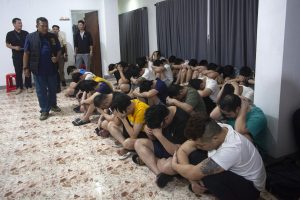On Monday, the U.S. Department of State released its Trafficking in Persons (TIP) Report, a monumental annual undertaking to comprehensively document the global status quo for human trafficking and modern slavery. As part of the assessment process, each country is assigned a tier ranking based on its observed progress and efforts to combat this violent crime. Countries receiving the lowest ranking (Tier 3) risk congressionally mandated sanctions, aid embargoes, and a host of other unilateral incentives to drive reform.
At least in theory.
In practice, these tougher Trafficking Victims Protection Act (TVPA) provisions are rarely activated. According to the landmark 2001 legislation, the U.S. president is authorized to stave off sanctions by offering a waiver to any Tier 3 country where it is “in the U.S. government’s strategic interest” to do so, within 90 days of the TIP Report’s release. Given myriad competing U.S. foreign policy objectives, waivers are virtually guaranteed for most Tier 3 countries each year.
Yet, given how emerging forms of human trafficking are directly impacting Americans and destabilizing the region, a rethink on TVPA waiver strategy is urgently needed.
Over the last three years, a new transnational criminal industry targeting Americans has exploded in Southeast Asia, enslaving over 300,000 people and raking in over $60 billion per year, according to a recent report from the U.S. Institute of Peace.
Victims from more than 60 countries are recruited by fraudulent social media job posts and then trafficked to fragile and corrupted destination countries. Upon arrival, they are locked in large compounds resembling penal colonies and forced to conduct sophisticated fraud schemes under threat of extreme violence.
The highly labor-intensive scams (known as shazhupan, or “pig butchering,” in Mandarin) typically involve building trust with a mark over months before subtly directing them into fraudulent crypto investment opportunities.
Market forces and sweeping Chinese law enforcement efforts against compounds targeting Mandarin speakers are pushing this industry increasingly toward American scam victims. The obnoxious and ubiquitous “missed connection” texts that plague the contemporary U.S. messaging landscape are exponents of this trend.
“Hi John, good to see you at Mary’s party last week.”
You don’t recognize the sender. Your name is not John and, most likely, you weren’t at Mary’s party last week.
The correct move here is to block and report, but many engage – alerting the crime syndicate to a working number and potentially opening the door to deception down the line. The tragic part of this daily annoyance and simmering risk to U.S. citizens is that the person sending that message is likely a slave – in a “Tier 3” country’s state-protected cash cow industry.
In Myanmar, scam compounds flourish in areas of contested sovereignty. They are most prevalent in territories occupied by junta-affiliated militias and are frequently owned and operated by China-originating organized criminals. Their existence is welcomed by a cash-starved military junta and its affiliates, who leverage the lucrative criminal industry to fuel a brutal civil war.
In Cambodia, militarized scam sweatshops are dispersed widely across the Kingdom, in repurposed apartments, hotels, and casinos. The TIP Report states that “senior [Cambodian] government officials and advisors owned – either directly or through businesses – properties and facilities utilized by online scam operators to exploit victims in labor trafficking and financially benefited directly from these crimes.” When queried by local media about this indictment the Cambodian government’s formal response was to feign ignorance. Yet, with relevant public records on the compounds widely available and years of evidence now accumulated on the abuses therein, the window for plausible deniability is long since closed. Wide-ranging parallel investigations validate an owner list that includes tycoons, senators, ministers, advisors, and even family members of Prime Minister Hun Manet.
While Cambodia is ranked as the second most corrupt country in the world, what is unfolding here well exceeds mere corruption and amounts to a historically significant phenomenon of state organized crime. At a conservative estimate of $12.5 billion per year, forced scamming revenue in Cambodia now eclipses all other domestic industries, combined. It also more than doubles the annual value of Chinese and Western aid, combined. Accounting for more than 50 percent of the country’s annual GDP, the sustained flourishing of this malign industry is likely now an existential concern for the ruling Cambodian People’s Party. The regime has behaved accordingly for years – locking up, threatening, and suing activists; covering up mysterious deaths; and shuttering local media outlets reporting on the issue.
Accountability is desperately needed to curb these abuses but this is exceedingly unlikely to emanate from profoundly compromised Cambodian or Myanmar justice systems. And while these countries are the global epicenters of this form of human trafficking and transnational crime, this is not merely a Southeast Asian phenomenon. It is now a lucrative, proven criminal-abusive industry and reports of similar rackets are now popping up in the United Arab Emirates, Ghana, Zambia, Mexico, and parts of Eastern Europe.
As Interpol Secretary Jurgen Stock stated recently, “just about anyone in the world could fall victim to either the human trafficking or the scams themselves.” With hundreds of thousands enslaved, tens of billions stolen, and entire governments compromised or destabilized, this is an urgent global security issue that demands a proactive, coordinated response.
In TVPA sanctioning authority, the U.S. wields a powerful weapon to engage in this global fight. The time to begin using it is now.

































